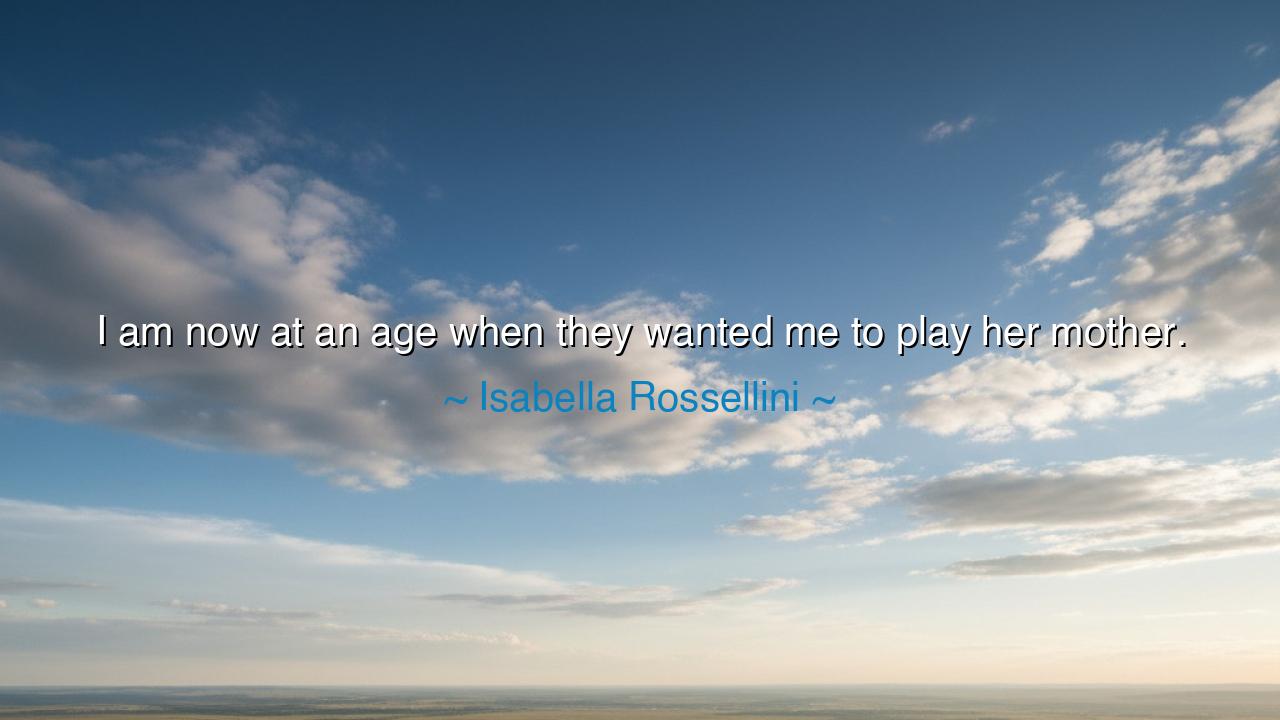
I am now at an age when they wanted me to play her mother.






The luminous Isabella Rossellini, daughter of cinematic royalty yet ever her own woman, once said with quiet poignancy: “I am now at an age when they wanted me to play her mother.” Within this simple, almost offhand remark lies a reflection on time, womanhood, and the illusions of youth and age. Beneath its humor is a note of rebellion — a lament against an industry, and perhaps a society, that measures worth by freshness of face rather than depth of spirit. But more than that, it is a meditation on transformation: the inevitable passage from muse to matriarch, from ingénue to sage, from beauty idolized to wisdom embodied.
The origin of this saying comes from Rossellini’s experience in Hollywood, where the mirror of fame is both adoring and cruel. Once hailed as one of the most enchanting women on screen — model, actress, and daughter of Ingrid Bergman — she reached a point in her career where she was told she was no longer suitable for romantic roles. Instead, the scripts began to offer her the part of the mother to the very kind of characters she once played. With characteristic grace, Rossellini did not rage at this transition; she observed it, naming the absurdity of it while also recognizing its truth. It was as though she stood before the wheel of time, watching it turn, and spoke with a bittersweet smile: “Ah, so now I am the mother.”
In her words there is not merely complaint, but acceptance and wisdom. For every age, she seems to remind us, carries its own beauty — though the world may not always recognize it. To play the mother is not to lose one’s worth; it is to embody the continuation of life itself. The youth that once captivated the screen does not vanish — it deepens, it changes color like autumn leaves, gaining radiance of another kind. Yet in the world of cinema, as in much of life, people often mistake aging for decline. Rossellini’s statement shines as both critique and revelation: a reminder that maturity is not the end of beauty, but its ripening.
Consider, for a moment, the story of Sophia Loren, who too faced the same turning of the years. Once the siren of the silver screen, adored by millions, she found herself cast in the roles of matriarchs and grandmothers. But rather than resist, she embraced it. She carried into those roles not the vanity of lost youth, but the grace of remembrance. Her performances grew richer, her gaze more profound, her presence more commanding. What had been charm became gravitas; what had been allure became dignity. So too does Rossellini remind us that the seasons of life are not rivals, but chapters of the same story.
The meaning of Rossellini’s words extends beyond the stage and screen. It speaks to all who age — to women and men alike — who find themselves confronted by the changing gaze of the world. There comes a time when others begin to see you differently: when youthful admiration gives way to quiet respect, or sometimes to indifference. But in that moment lies the chance to claim a new kind of power: the power of self-knowledge, of authenticity, of inner peace. The roles life offers may change, but the essence of the soul remains eternal.
Her reflection also invites us to question the standards of beauty and value that our age worships. What is beauty, if it fades with the skin? What is strength, if it depends on youth? The wise know that beauty is not in perfection, but in presence — the courage to be fully oneself at every stage of life. To age, then, is not to diminish, but to distill: to shed illusions and reveal what is true. Rossellini’s calm acceptance becomes a kind of defiance — the defiance of serenity in a world terrified of time.
The lesson, therefore, is this: embrace your becoming. When the world tries to tell you that your time has passed, know that your time is now, as it always was. Youth is a flame; age is the hearth that sustains the fire. Do not mourn the roles you no longer play; honor the wisdom that allows you to play new ones. Whether on the stage of life or of art, each transformation is sacred, for it draws you closer to your most complete self.
Thus remember, O traveler through time: the mirror may change its reflection, but it cannot capture your spirit. The world may call you “mother” when once it called you “maiden,” but both are faces of the same eternal being. Walk proudly through each season, for the beauty of life lies not in remaining unchanged, but in becoming more deeply yourself. And when they ask you to play the mother — smile, and play her with the strength, grace, and love that only a life well-lived can give.






AAdministratorAdministrator
Welcome, honored guests. Please leave a comment, we will respond soon